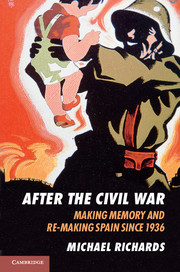Book contents
- Frontmatter
- Contents
- List of maps and tables
- Preface
- Acknowledgements
- Maps
- Introduction: cultural trauma in Spain
- Part I Setting the scene
- Part II Memories of war during the Franco years
- Part III Memories of war after Franco
- 10 Transition and consent: the presence of the past, 1975–1980
- 11 ‘The level of our times’: memory and modernisation, 1981–1996
- 12 Collective identity and the ethics of memory, 1996–2007
- Conclusion: the history of war memories in Spain
- Glossary and abbreviations
- Sources and select bibliography
- Index
- References
10 - Transition and consent: the presence of the past, 1975–1980
Published online by Cambridge University Press: 05 June 2013
- Frontmatter
- Contents
- List of maps and tables
- Preface
- Acknowledgements
- Maps
- Introduction: cultural trauma in Spain
- Part I Setting the scene
- Part II Memories of war during the Franco years
- Part III Memories of war after Franco
- 10 Transition and consent: the presence of the past, 1975–1980
- 11 ‘The level of our times’: memory and modernisation, 1981–1996
- 12 Collective identity and the ethics of memory, 1996–2007
- Conclusion: the history of war memories in Spain
- Glossary and abbreviations
- Sources and select bibliography
- Index
- References
Summary
Those of us born after 1939 have had to clear the undergrowth away from our recent past, a past which has left us with too many defects to reconstitute our historical health. We are consciously or unconsciously ignorant. If we are conscious of it we suffer resentment and anger.
History and the democratic state
Precisely a year after Franco's death, the Nationalist ex-combatants' confederation sent a letter to all those holding mayoral office in Spain with a reminder to commemorate the occasion. On the same day, 20 November 1976, the editorial in the liberal newspaper El País invoked the 1930 command of the country's most eminent philosopher of modernity, José Ortega y Gasset, made in the aftermath of the fall of General Primo's earlier military regime: ‘the state does not exist. Spaniards: reconstruct your state!’ Ortega had been calling for a republic and for the monarchy of Alfonso XIII to be toppled, and there is some irony in the fact that his call should be remembered when the hopes for democratisation in 1976 depended on the legitimacy of another monarch, King Juan Carlos. The fact remained, however, that in the turbulent wake of the dictatorship's demise, powerbrokers nationally and internationally perceived that the new political order had to be seen to be based on explicit social consent if its stability was not to be compromised.
The role of memory in processes of political legitimation is never more important than during transitions to democracy. Hence, the enthusiastic sponsorship across the political spectrum of the Amnesty Law of 1977, as discussed in Chapter 9. Though politically rational, consigning the conflictive past to ‘oblivion’ through a tacit ‘pact of forgetting’ seemed, nonetheless, to some observers at the time and many others since to have favoured those who had supported and participated in the Franco system.
- Type
- Chapter
- Information
- After the Civil WarMaking Memory and Re-Making Spain since 1936, pp. 277 - 303Publisher: Cambridge University PressPrint publication year: 2013

